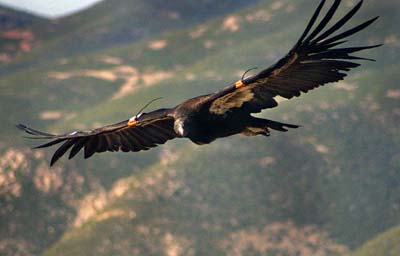A law proposed by Central Coast Assemblyman Bill Monning would
make it easier for California condors to get a meal after they are
released into the wild.
By Larry Parsons
A law proposed by Central Coast Assemblyman Bill Monning would make it easier for California condors to get a meal after they are released into the wild.
Released birds typically chow down on specially provided carcasses of stillborn calves from dairies, until their natural food-scavenging instincts become attuned to the wild, said Kelly Sorenson of the Ventana Wildlife Society.
Providing the newcomers such sustenance has been the practice with the condor recovery program, in which birds are bred in captivity and then released. Current state law doesn’t specifically allow or prohibit feeding free-ranging condors.
That would change under Assembly Bill 1956 authored by Monning, D-Carmel. The legislation, which passed the Assembly on a 61-0 vote, would set up guidelines for feeding and feeding sites under revised condor recovery agreements with the state Department of Fish and Game.
“It really is just to enable it … and recognize that putting out food is necessary at this stage,” Sorenson said.
Monning said the measure would help ranchers, wildlife officials and others in their efforts to assist condors as part of the state-federal recovery program.
Current law ignores the foraging needs of newly released condors and prohibits transport of dead animals except for burial on owners’ property. The new law would allow transport to proper condor feeding sites.
“It’s a way to establish a controlled network of food placement for the birds,” Sorenson said.
The measure next goes to the Senate.
Sorenson said he is hopeful it will pass the upper house, though the Department of Fish and Game has put a $125,000 price-tag on revising the existing condor recovery agreements.
“That might not bode well, but it sure seems no one is against it,” Sorenson said.
The world population of California condors is 348, with 95 in the California wild, 18 in Baja California, 74 in Arizona and 161 in breeding centers.
The sole source of food in the wild for condors is carrion.









